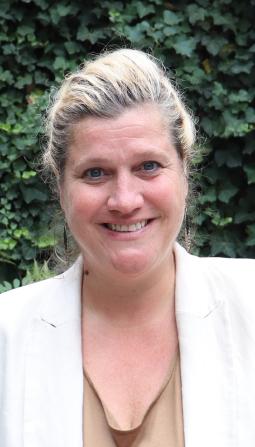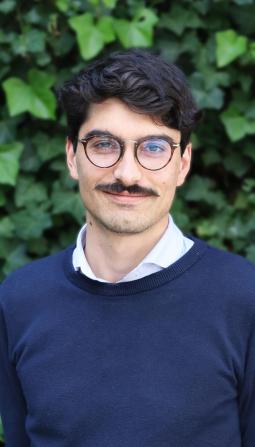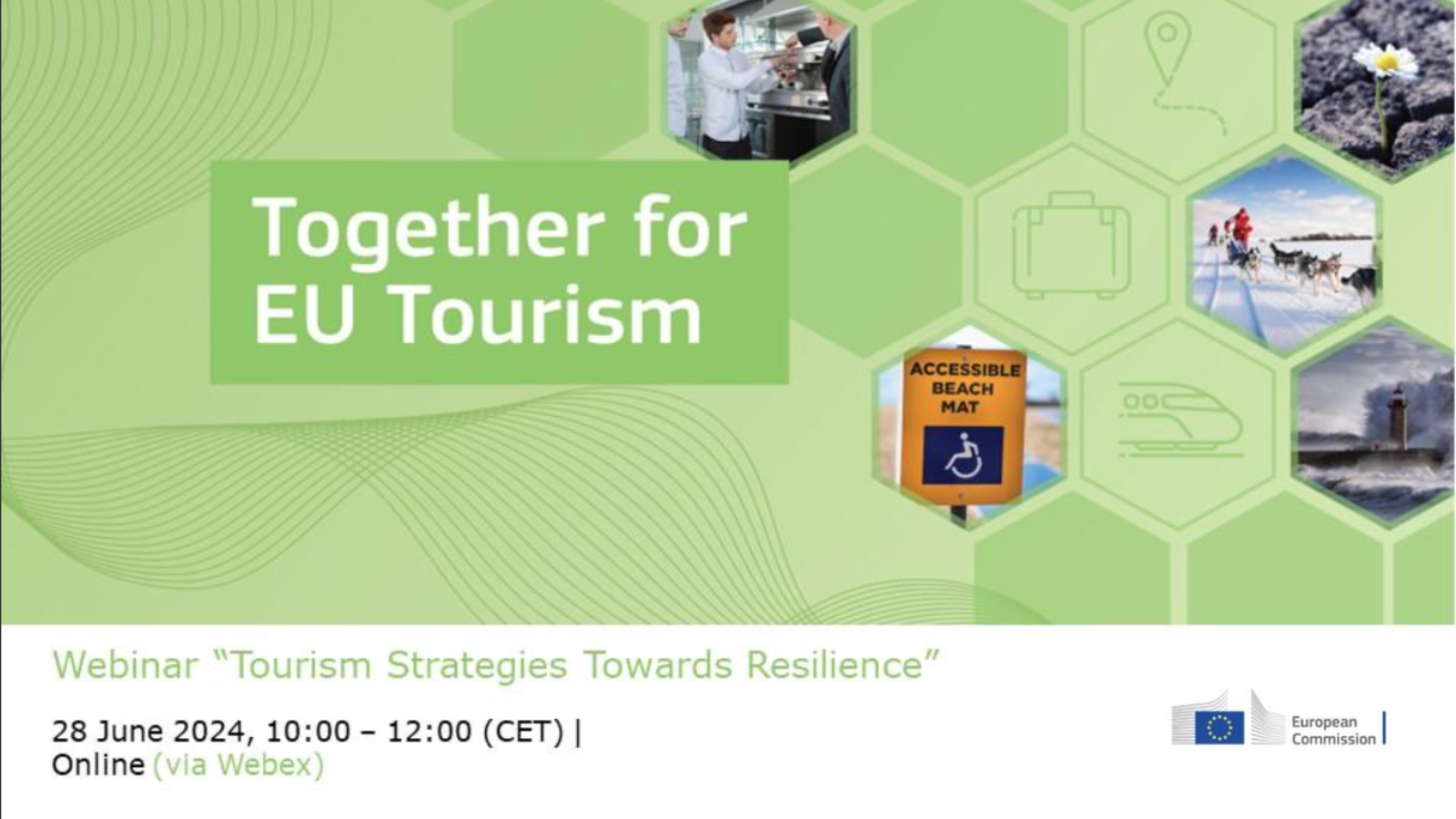
Together for EU Tourism: Webinar on Tourism Strategies Towards Resilience
As part of the Commission expert group "Together for EU Tourism" (T4T), a webinar on Tourism Strategies Towards Resilience will be held on 28 June from 10:00 to 12:00. This webinar aims to raise awareness around two key elements of tourism strategy, which are of increasing importance in a European context:
- How to improve social sustainability strategies for tourism at the destination level with commensurate benefits for communities, for visitors and for businesses.
- How to empower public authorities and local decision-makers in rural areas to evaluate, benchmark and enhance their tourism strategies and policies.
By the end of this webinar, participants will gain access to tools, strategies, and best practices that can inspire and facilitate the implementation of new approaches and strategies for tourism management and development.
The objectives of this webinar are to:
- Raise awareness of how traveller behaviour and responsible travel practices can be integrated into tourism strategies.
- Highlight the importance of measurement and data in assisting rural destinations to sustainably plan and manage their tourism offer and services.
- Provide guidance to tourism stakeholders on implementing effective strategies to enhance resilience in tourism, at both rural and destination levels.
- Showcase best practices that inspire new approaches to destination planning and tourism strategies.
All tourism sector stakeholders are invited to participate, including EU level and national policymakers, local authorities, tourism businesses and associations, community groups, travel companies and tour operators who are interested in enhancing knowledge about new approaches to tourism management as a pathway to enhanced sustainability and economic efficiency.
Interested participants can register here.
- 28/06/2024 - 10:00 - 28/06/2024 - 12:00
- Francesca Pozzebon
-
Working Group
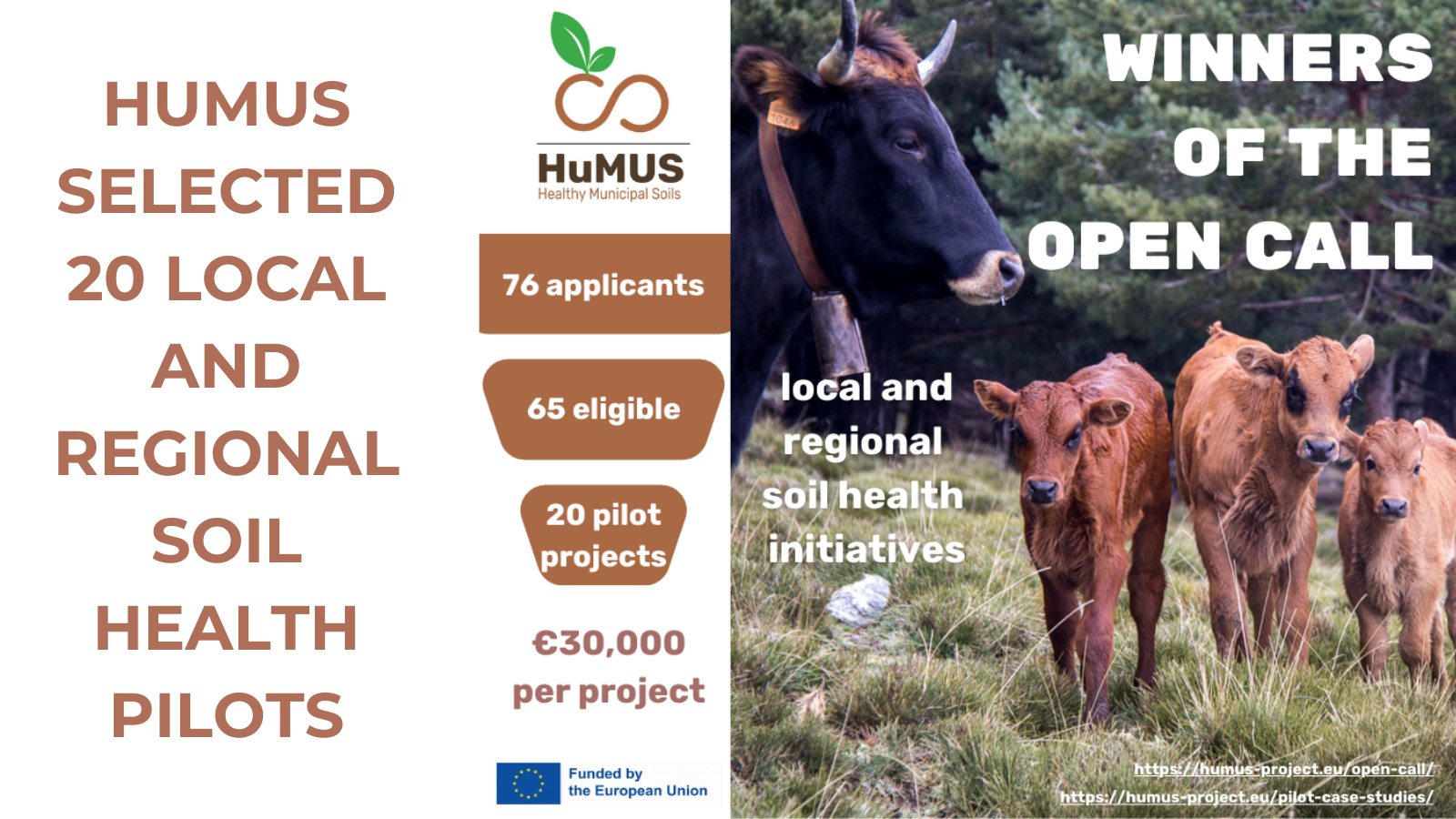
HuMUS Project selected 20 local and regional soil health pilots
The HuMUS project has selected the 20 local and regional soil health pilots, including 10 located in ERRIN member regions, that will be supported to enhance participatory methods and tools for soil quality and health governance.
The results of the calls were announced for the first time during ERRIN’s Bioeconomy WG meeting on the 'Mission Soil: lessons learned and upcoming opportunities'. By the deadline, 76 applications were received from 27 Countries. Municipalities and local stakeholders in Austria, Belgium, France, Israel, Italy, Hungary, Poland, Portugal, Romania, Spain, Ukraine, will:
- implement effective participatory processes to enable and stimulate dialogues on soil health and sustainable land management at local and/or regional level;
- develop engagement and awareness raising actions on soil health among local and regional authorities contributing to the development of soil innovation ecosystems;
- draft regional or local action plans to integrate the improvement of soil health in policies and programmes, on the basis of any good practice example identified in other EU countries and regions.
Among the expected outcomes of the call is the signing of Territorial Management Agreements aimed at the sustainable management of soil health issues or threats in the local or regional communities and an analysis of replication Potential, evaluating the likelihood and feasibility of replicating the adopted approach in a different context and/or scale.
Learn more about the outcomes of the call and meet the selected Pilots here.
The HuMUS project is an ERRIN members-driven project. ERRIN has been promoting the cascade funding call with its members and, through its Bioeconomy WG, will follow up on the project’s activities, disseminating the best practices and outputs of the project.
- Gianpiero Petruzziello
- 13/06/2024
-
Working Group
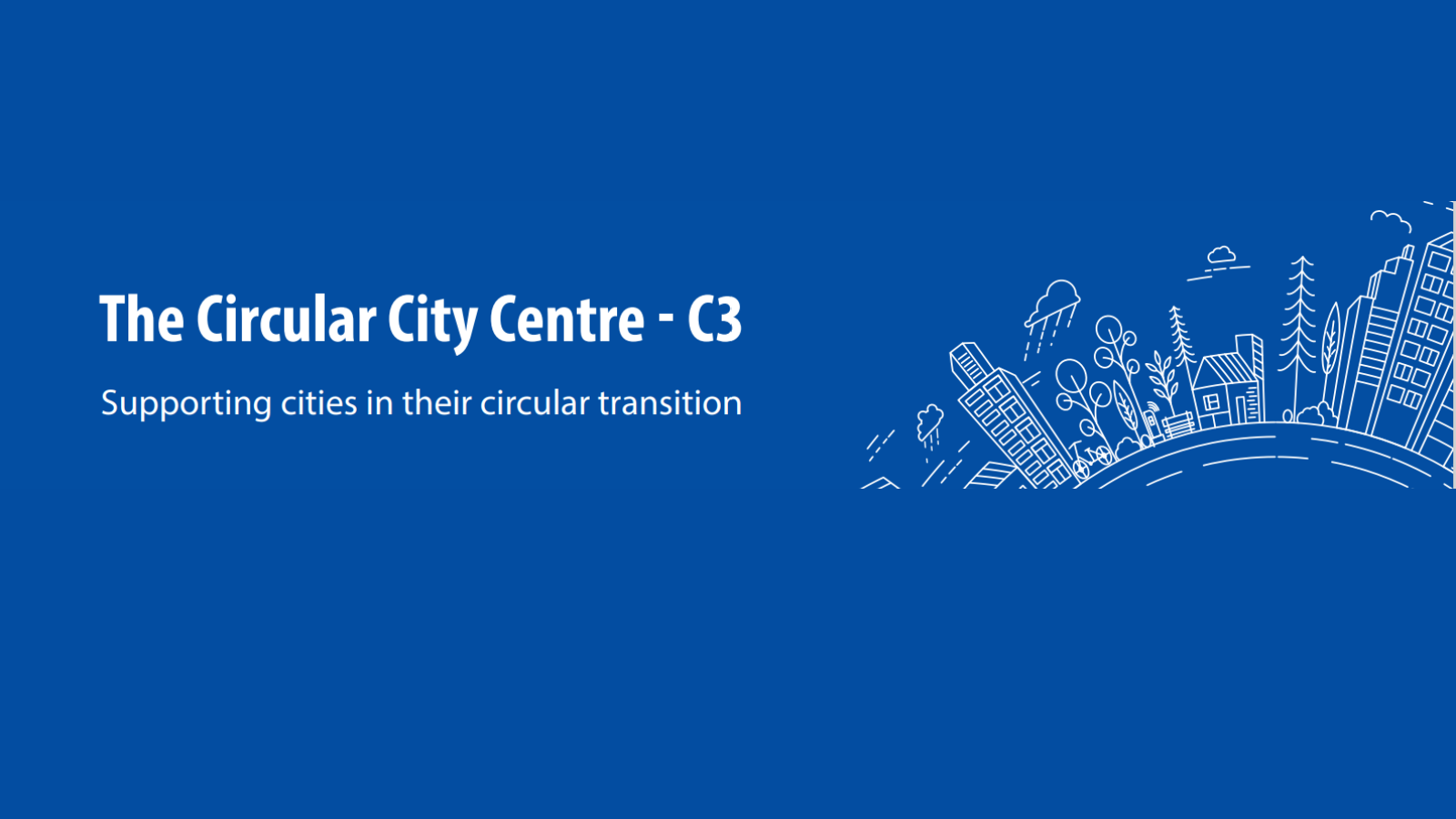
EIB's Circular City Centre (C3) initiative continues: support to thrive the circular transition in cities
The Circular City Centre (C3), a support scheme of the European Investment Bank (EIB), launches a new phase of support to cities offering advice on their circular economy agenda and investment projects. Cities can benefit from guidance documents, resources, circular city advisory and capacity building and project advisory services.
Recognising the role of cities as cradles and catalysts of circular action and change, C3 is a competence and resource centre aimed at supporting EU cities in their transition to a circular economy. Its main focus is to help cities advance their circular economy agenda and prepare impactful circular projects for financing. C3 is led by the European Investment Bank, under financing from the European Commission and with external support from a consortium comprising Circle Economy, Arup, ICLEI Europe, and ECORYS.
C3 supports cities in four ways:
- Provision of guidance documents on relevant circular topics and other tools for awareness raising and mobilisation;
- Facilitation of circular knowledge sharing and dissemination through webinars, roundtable discussions and other activities;
- Circular City Advisory (CCA) programmes supporting cities at various stages of their circular transition. The CCA comprises 3 standardised programmes, each consisting of a series of 4 workshops with active exchanges between the C3 team and the city representatives. A description of the C3 CCA programme can be found here.
- Circular Project Advisory (CPA). This service offers tailored advisory support aimed at developing sizeable and mature projects towards investment readiness and implementation. A description of the C3 CPA programme can be found here.
All C3 services are provided free of charge to municipalities and other public sector promoters acting on their behalf. More information about C3 can be found on the C3 web page or in this 2-page C3 in-brief document attached.
Cities interested in the C3 advisory support, can express their interest by using the form for the service that best aligns with your level of progress and needs, here for the CCA and here for the CPA, and send it to C3@eib.org.
The EIB is an associated partner of the Circular Cities and Regions Initiative, one of ERRIN projects. Circular econmy is one of the important topics, which is followed up upon by ERRIN's Bioeconomy Working Group.
- Astrid Hannes
- 12/06/2024
-
Working Group
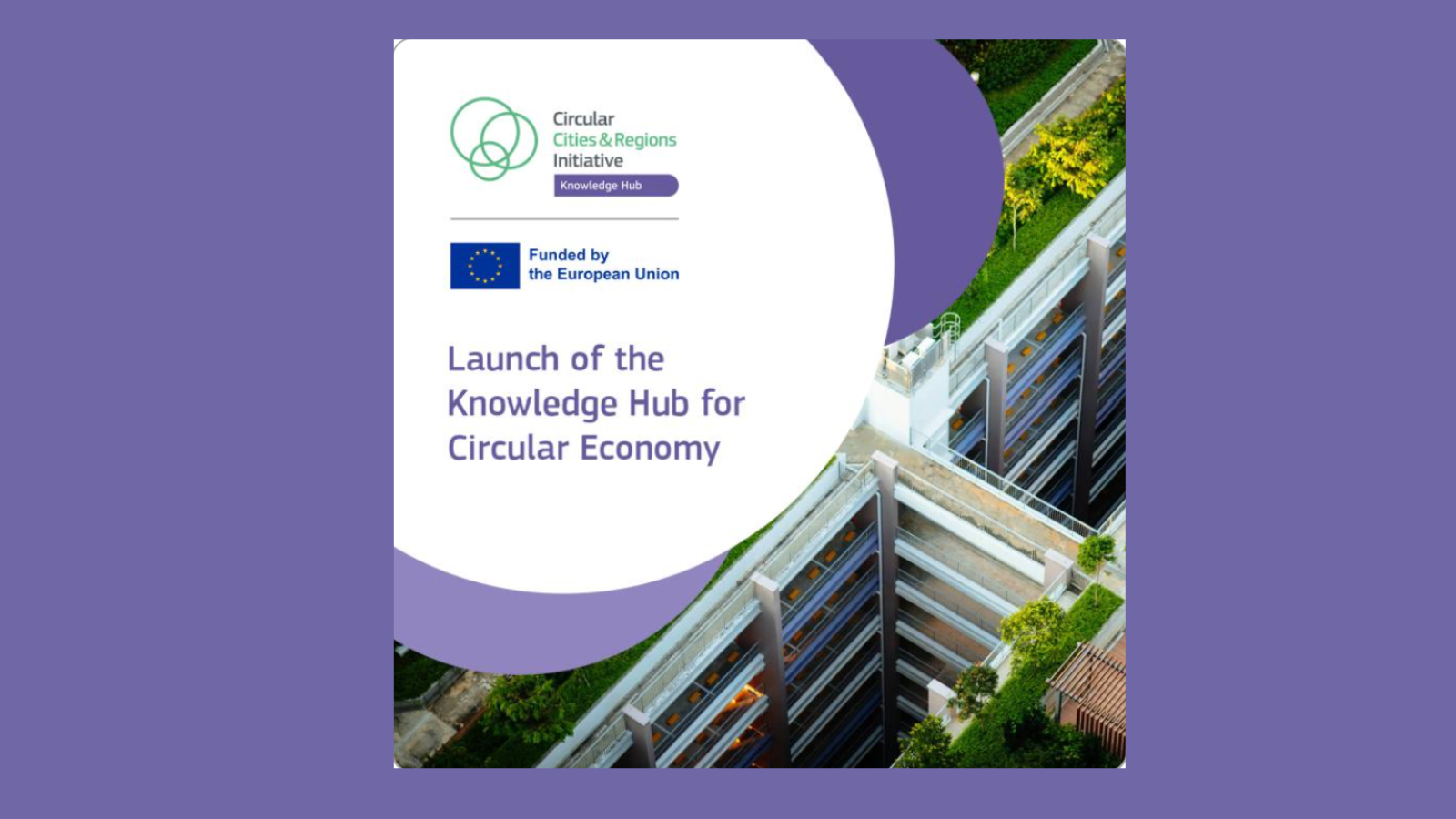
Launch of the new CCRI Knowledge Hub for Circular Economy
The Circular Cities and Regions Initiative (CCRI) has launched its new CCRI Knowledge Hub. This knowledge hub will offer a wide range of instruments, including good practices, methods, reports and a digital marketplace for enabling technologies to facilitate the implementation of circular economy practices in regions and cities. It will target any European cities and regions, including those only starting their circularity transition. The CCRI Knowledge Hub is supported by the K-CCRI consortium, a Horizon Europe funded project.
The CCRI Knowledge Hub services will include:
- Easy access to key knowledge and resources
- New opportunities to take part in a locally-tailored mentoring programmes
- Capacity-building activities on various topics ranging from public engagement, innovation & technology, and impact evaluation to business models and financial support
CCRI Knowledge Hub has already started the screening and collection phase: 150 existing projects are being selected as virtuous examples and will be the “tank” of best practices to be shared and replicated over European regions and cities. The Knowledge Hub’s methodology will lead to the development of personalised support for the local implementation of circular economy practices and, lastly, to recommendations for policymakers.
How does the CCRI Knowledge Hub work?
The activities and support services are threefold:
- Screen, collect and analyse circular economy projects’ and initiatives’ good practices and resources
- Support circular economy action at city/region level
- Facilitate evidence-informed policymaking
The CCRI Knowledge Hub’s activities will complement those that have been offered so far by the CCRI Coordination and Support office and its partners. Both teams will work in close cooperation and operate under the same umbrella initiative to offer the best possible support services to the European cities and regions.
More information
Learn more about the CCRI Knowledge Hub in the presentation attached.
The Circular Cities and Regions Initiative (CCRI) is one of ERRIN's projects in which we manage the wider community of local and regional stakeholders interested in the circular transition and driving its implementation at local and regional level. CCRI is closely followed by ERRIN's Bioeconomy Working Group. We are delighted to count over 20 ERRIN members among CCRI Pilots and Fellows.
- Astrid Hannes
- 12/06/2024
-
Working Group
Astrid Hannes
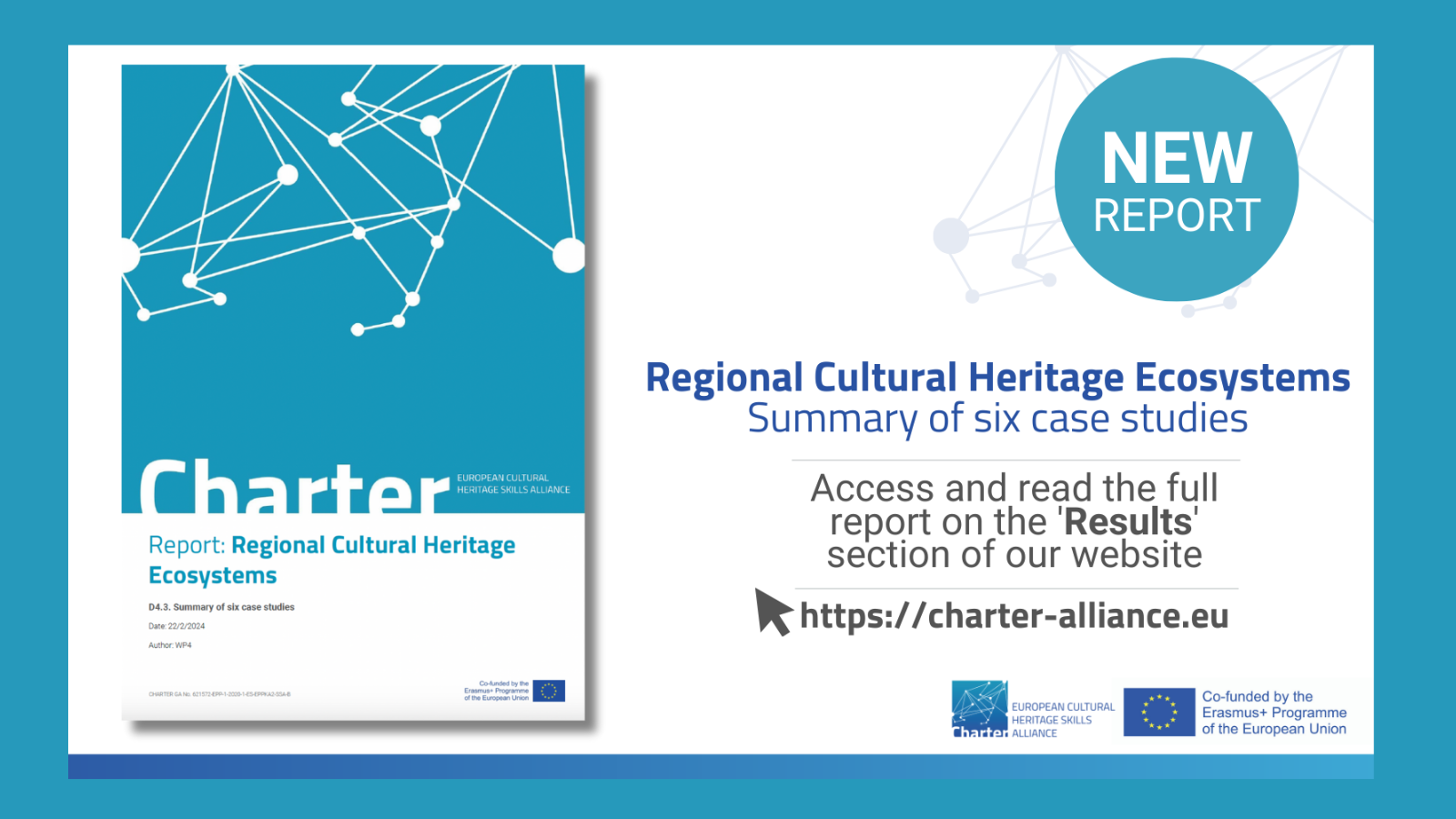
How is cultural heritage integrated into regional development? CHARTER Alliance publishes new report on six regional case studies conducted by ERRIN
Regional Cultural Heritage Ecosystems: CHARTER Alliance publishes findings from six regional case studies.
The European Cultural Heritage Skills Alliance CHARTER, an Erasmus+ funded project, has published a new report showcasing all the findings and conclusions derived from the regional case studies conducted by ERRIN members in the Basque Country (Spain), Sibiu (Romania), Bremen (Germany), Alentejo (Portugal), Tuscany (Italy), and Västra Götaland (Sweden). This report synthesises how cultural heritage and related skills are integrated into regional development policies and strategies and examines sector-integrated dynamics within these ecosystems.
The six regional workshops, held from October 2021 until June 2023, form the basis of this report. These workshops brought together diverse stakeholders from each region’s heritage ecosystem, who engaged in presentations, panel discussions, surveys, focus groups and interactive work sessions to provide CHARTER with insights and data. Simultaneously, stakeholders were introduced to CHARTER models, tools, and assumptions to test and share their feedback, thereby contributing to the refinement of the project’s results. Additionally, field visits to observe best practices and dialogue with practitioners in their day-to-day professional working environments helped further understand each hosting region's unique features, projects, and assets.
How do cultural heritage stakeholders interact?
The case studies highlight fragmented dynamics within the ecosystems. Despite stakeholders' willingness to collaborate, short-term project-based efforts and siloed approaches hinder systemic integration. Additionally, a lack of deep mutual understanding between education providers and heritage professionals makes the process more challenging. As the topic of skills is relatively new to most regions, vertical and horizontal policy alignment is critical to guarantee the necessary skills supply for ensuring that ambitious national cultural heritage policy objectives can be successfully implemented at regional and local levels. This is particularly important as some regions hold competencies in Education & Training, but many do not. CHARTER suggests strengthening medium- and long-term collaborations and fostering trust among ecosystem actors. Engaging private sector employers and professionals from related sectors like tourism and construction is also crucial.
In this context, the report identifies regional authorities as key figures in fostering collaboration within heritage ecosystems. Their local knowledge is essential in mobilising stakeholders, though engaging self-employed entrepreneurs and private companies remains challenging. Regular networking opportunities and a sector-integrated approach are recommended to enhance ongoing dialogues and collaboration.
What do the regional cases tell us about Education and Training?
Despite challenges, many small-scale innovative Education and Training solutions are emerging at the regional level, and regional authorities are establishing and strengthening Regional and Interregional Skills Partnerships. Increased networking and collaboration among stakeholders can enhance the scalability of successful initiatives.
There’s still a need to prioritise Continuous Professional Development to face the impact of the Digital, Green, and Blue transitions on cultural heritage. The report recommends developing long-term regional skills policies to enhance skills governance and strengthen skills intelligence at the regional level through data-driven policies. Establishing Regional and Interregional Skills Partnerships is suggested to maximise the impact of local and regional efforts and improve knowledge circulation. The report highlights the importance of comprehensive long-term cultural heritage strategies, emphasising systemic approaches to assess and address skills shortages and mismatches. Recommendations include prioritising Continuous Professional Development (CDP), promoting micro-credentials, and strengthening skills governance through collaboration and data-driven policies.
In the specific case of crafts and crafts-related competencies, a significant risk of these skills disappearing across all studied regions has been detected, some of which are already lost. Urgent actions are needed at all governance levels to revitalise these skills, including recognising non-formal learning and ensuring traditional crafts' eligibility for EU funding.
Continue reading the full report attached.
About CHARTER
Together with six, it brings together and represents the whole range of the European cultural heritage sector. The 47 project partners strive to make cultural heritage's value apparent and create a resilient and responsive sector. ERRIN and its members pioneered this first sectoral skills blueprint project under Erasmus+, which included regions that have been included from the start and took a solid regional focus when investigating the skills demands and supply in the sector.
- Learn more about the role of ERRIN members in the CHARTER project
- Learn more about the CHARTER Alliance
- Learn more about the other CHARTER project results
- Subscribe to the CHARTER newsletter: https://bit.ly/newsletter-CHARTER
- Astrid Hannes
- 12/06/2024
Astrid Hannes

AI for local and regional authorities – Survey for the Committee of the Regions stakeholders’ consultation
In May 2024, the Committee of the Regions and its ECON Committee had an initial exchange on an own-initiative opinion related to ‘Challenges and opportunities of artificial intelligence in the public sector: defining the role of regional and local authorities’. The opinion aims to specify the public sector’s priorities and strategic objectives and how best to implement the new law on AI to benefit citizens and businesses through the creation of a digital ecosystem that is transparent, accountable and consistent with European values.
You will find the first outline of their discussion on this page.
This opinion would be based on four main strategic objectives identified for the role of local and regional authorities:
- Gather different actors of the digital ecosystems for an inclusive digital transformation
- Create and implement comprehensive and robust data strategies
- Share learning and use cases for transparency and public participation in AI decision-making processes
- Support the adoption of AI technologies through a solid skills governance in the region
With Alberto Cirio, President of the Piemonte region as rapporteur, the Committee of the Regions confirmed the organisation of a stakeholder consultation, expected in September 2024, to which they will invite a wide range of interested parties.
With AI's growing importance and related challenges, the ERRIN ICT WG organised a meeting on Artificial intelligence-related strategies at local and regional level on 12 June 2024. This meeting aimed to open the floor to ERRIN members' use cases, allowing the initiation of a structured dialogue with the European Commission on local and regional needs and challenges related to Artificial Intelligence.
The ERRIN ICT WG wishes to produce an input paper for this consultation process, building on the content of the AI strategies meeting. With the following question, we wish to collect ERRIN’s members’ needs, challenges and solutions related to Artificial intelligence.
We kindly ask you to answer this survey before Friday, 12 July 2024.
If you wish to get involved in the drafting process, review the document or any other activities, do not hesitate to contact rodolphe.doite@errin.eu.
- Rodolphe Doité
- 12 June 2024
-
Document
-
Deadline12 July 2024
Rodolphe Doité
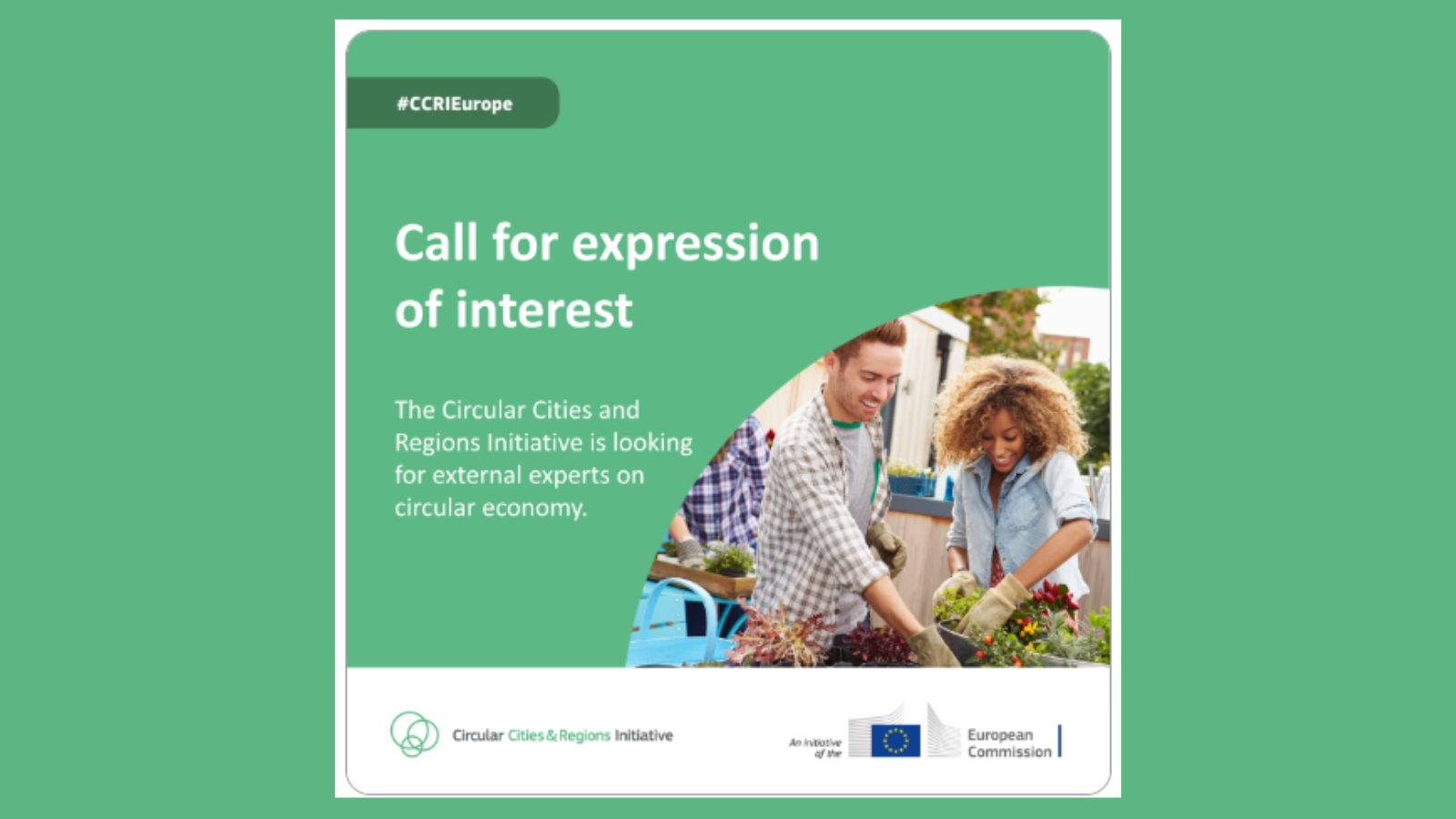
Extended deadline: Call for Circular Economy Experts providing personalised support for cities and regions
As the Circular Cities and Regions Initiative grows, its support to its community is deepening as well. To continue its objective of implementing the circular economy across Europe’s cities and regions, the CCRI is seeking to provide a space for in-depth learning and knowledge sharing.
Therefore, the CCRI is looking for external experts on the circular economy who can provide personalised support and mentorship to regions and cities willing to advance their circular transition. The experts selected will be asked to assist cities and regions through on-demand and tailored advisory and/or a mentoring programme.
Particularly, the CCRI is looking for a group of professionals and specialists in 5 key areas:
- Stakeholder and citizen engagement
- Innovation and technology
- Business models and financial support
- Public procurement
- Impact evaluation
Applicants must have at least five years of proven experience in at least one of the thematic areas, experience working with local and/or regional governments, and familiarity and knowledge of circular economy in cities/regions. Proficiency in English (at least C1 level in the CEFR) is required to ensure an effective dialogue with diverse practitioners.
Experts will receive a fixed fee between 750-900€ to remunerate their work. To express your interest in being added to the CCRI pool of experts, please submit your CV (maximum four pages, preferably in Europass CV format) and cover letter (maximum two pages) through this EU survey form.
The expression of interest is to be submitted by Friday, 14 June 2024.
More information can be found here.
The Circular Cities and Regions Initiative (CCRI) is one of ERRIN's projects and is closely followed by ERRIN's Bioeconomy Working Group. We are delighted to count over 20 ERRIN members among CCRI Pilots and Fellows.
- Astrid Hannes
- 14/05/2024
-
Working Group
Astrid Hannes
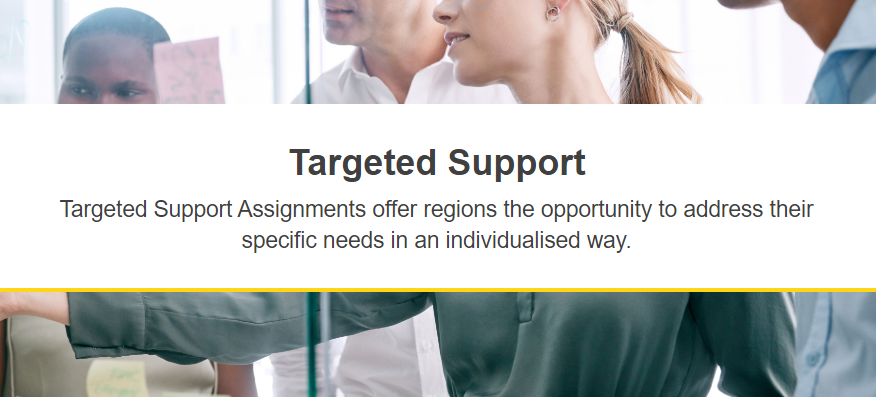
Call for EoI in S3 Targeted Support - Info session for ERRIN members
As a new round of applications for S3 Targeted Support Assignments offered by the S3 Community of Practice (S3 CoP) is currently open, ERRIN members are invited for a short info session to learn more about the initiative and the call for expressions of interest. The event led by the S3 CoP Secretariat colleagues will take place online on 17 June from 15:00-15:45 CEST.
The session will be informal and dedicated specifically to ERRIN and Vanguard Initiative members. Participants will be able to ask questions and engage in a discussion.
Registration is not necessary. If you wish to attend, please connect at the indicated time using the details below:
Meeting ID: 361 372 543 651
Passcode: PjdTrZ
The S3 Targeted Support Assignments aim to provide tailored assistance to regions and Member States with the fulfilment criteria and successful implementation of Smart Specialisation Strategies (S3), considering their specific needs and priorities. The support activities are based on the principles of co-design and collaboration between DG REGIO, the beneficiary region, the S3 CoP Secretariat, and the designated expert. The services are demand-led and can focus e.g. on support to Entrepreneurial Discovery Process, foresight scenario development in a particular value chain, among many different possibilities.
If you are an EU regional or national authority, and you wish to be involved in the next cohort of S3 Targeted Support Assignments, you can learn more about the call for Expressions of Interest here and apply to the ongoing call for Expressions of Interest as soon as possible here. Please note that applications are considered on a rolling basis and that the service delivery is expected to start in autumn 2024.
- 17/06/2024 - 15:00 - 17/06/2024 - 15:45
- This meeting will take place online
- Ewa Chomicz
-
Working Group
Ewa Chomicz
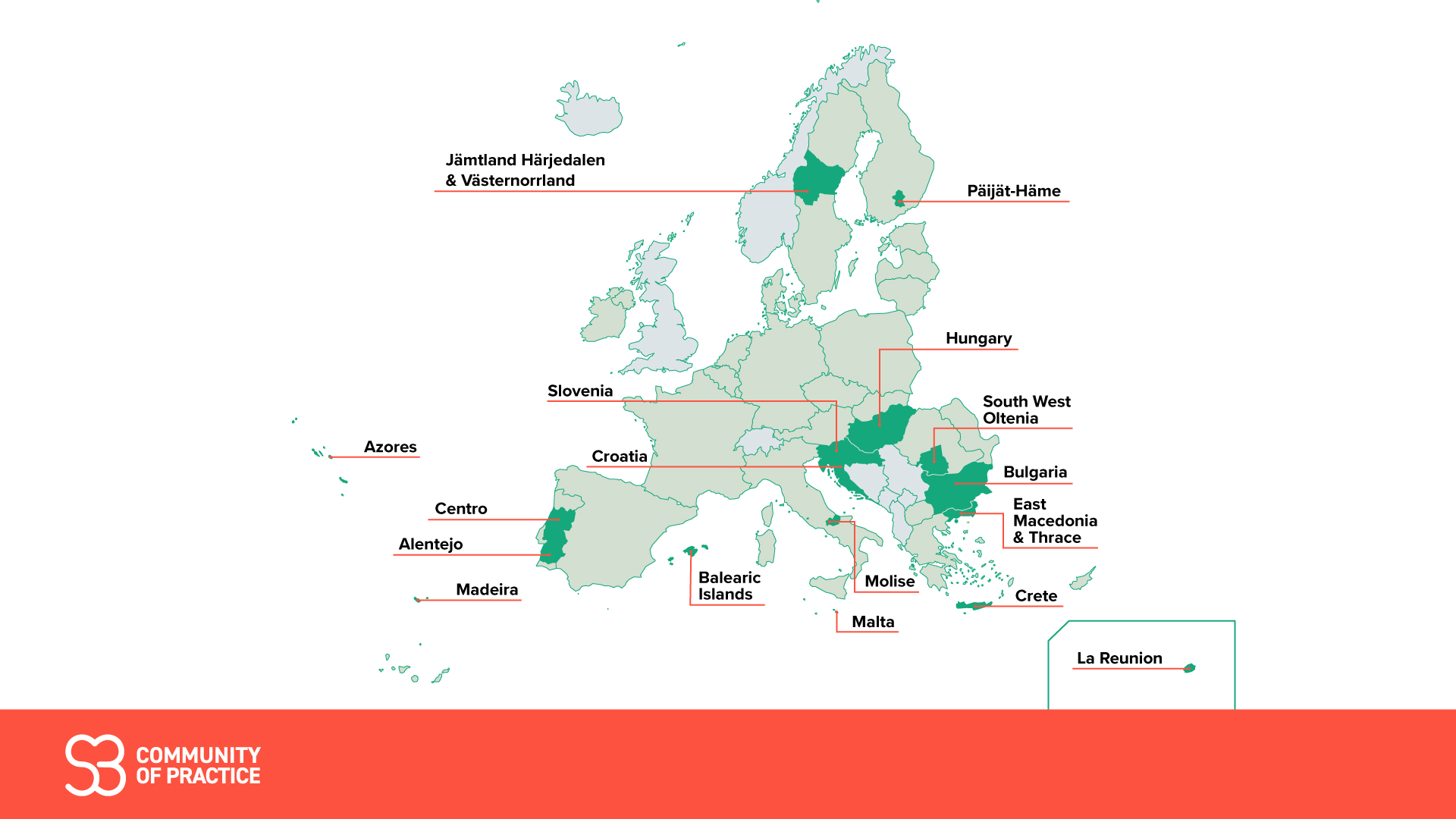
Call for Expressions of Interest in S3 Targeted Support
A new round of applications for S3 Targeted Support Assignments offered by the S3 Community of Practice (S3 CoP) is currently open to provide tailored assistance to regions and Member States with the fulfilment criteria and successful implementation of Smart Specialisation Strategies (S3), considering their specific needs and priorities. The support activities are based on the principles of co-design and collaboration between DG REGIO, the beneficiary region, the S3 CoP Secretariat, and the designated expert. The services are demand-led and can focus e.g. on support to Entrepreneurial Discovery Process, foresight scenario development in a particular value chain, among many different possibilities.
The delivery of Targeted Support will involve virtual meetings and expert visits to the territories, workshops with the local stakeholders, and the delivery of practical recommendations to address local challenges. The combination of work on the ground with expert analysis will allow to draw new insights about the status of S3 in the participating territories, and to move forward together, exchanging views and experiences with the wider S3 community.
If you are an EU regional or national authority, and you wish to be involved in the next cohort of S3 Targeted Support Assignments, you are invited to apply to the ongoing call for Expressions of Interest as soon as possible here. Please note that applications are considered on a rolling basis and that the service delivery is expected to start in autumn 2024.
A short informal info session on the call for EoI will be organised for ERRIN members by the S3 CoP Secretariat colleagues online on 17 June from 15:00-15:45 CEST, with the opportunity to ask questions. Learn more and find the link to join here.
So far, the S3 CoP Secretariat has embarked on the delivery of 17 Targeted Assignments, guiding regions towards effective S3 planning and implementation, with a focus on key areas such as:
- Interregional collaboration and value chain analysis
- Stakeholder involvement
- Governance
- Monitoring and evaluation
Find more information about S3 Targeted Support Assignments, examples of services offered and territories that have benefited so far, on the S3 CoP website here.
In case you need further clarification about the S3 Targeted Support Assignment scope and organisation, you may contact the S3 CoP Secretariat at contact@s3-cop.eu, with the possibility of organising a first scoping meeting.
- Ewa Chomicz
- 11 June 2024

SEFS Working Group is looking for a new co-leader
The Science and Education for Society Working Group (SEFS) is looking for a new co-leader to join Lärosäten Syd (Universities in South Sweden), the Oslo Region EU Office and the Welsh Higher Education Brussels - Welsh Government in steering the Working Group's activities and priorities.
The candidate should be knowledgeable and experienced in EU policy on education and training, have a good insight into key EU funding programmes for innovative education and training, and have the ability to link these to R&I policies. Among other criteria, we will consider the capacity and the portfolio of the candidate and the member organisation, as well as geographical and gender balance among leaders. In order to reflect the diversity of the ERRIN network in the co-leaders group, we particularly encourage ERRIN members representing regional authorities to apply for the position.
In 2024, the SEFS Working Group aims to capitalise the learnings from the EU Year of Skills and six regional case studies on regional skills ecosystems, conducted under the CHARTER project. This will feed into the ERRIN’s workstream of preparing FP10 and the new programming period. Furthermore, the WG monitors the discussions on the societal impact of R&I, knowledge valorisation and evidence-based policymaking, in line with the WG’s 2024 Work Plan and the Annual priorities.
The new co-leader will participate in the organisation and moderation of the SEFS WG meetings, project development activities, and follow policy developments around the topic. The new co-leader will closely work with the ERRIN Secretariat and represent ERRIN and the working group at member and institutional events. He/she will also contribute to the SEFS WG contribution in the Strategic cluster connecting with ERRIN's Policy, Innovation & Investment and Smart Specialisation Working Groups.
Please express your interest by sending an email to astrid.hannes@errin.eu stating your professional motivation and what you would like to achieve as a working group leader by 5 July EOB.
About the Working Group:
The Science & Education for Society Working Group addresses topics related to the concept of place-based universities and engagement with society and citizens while also working on the role of education in S3 as well as education and skills for research and innovation. The Working Group facilitates information sharing, knowledge development, and aims to strengthen existing and build new relationships with the EU institutions. Facilitating project development is also part of the Working Group's scope.
- Astrid Hannes
- 11 June 2024
-
Deadline05 July 2024
